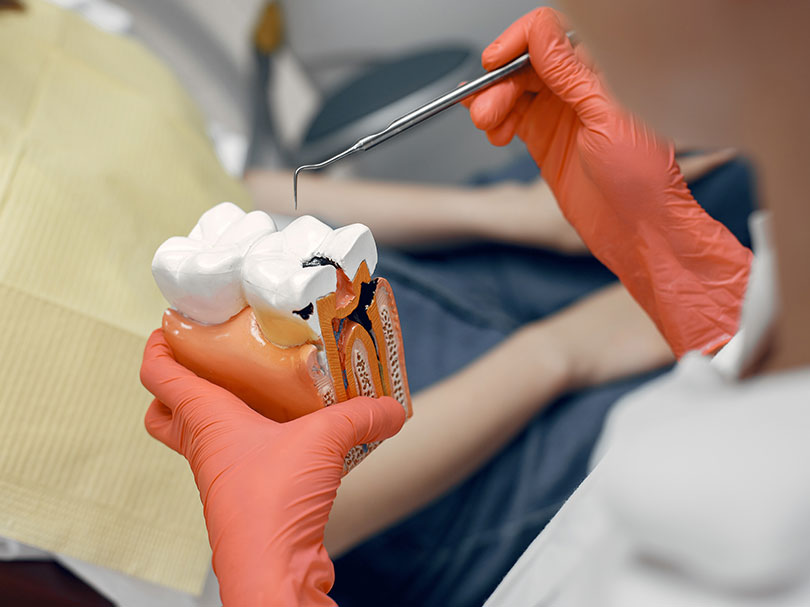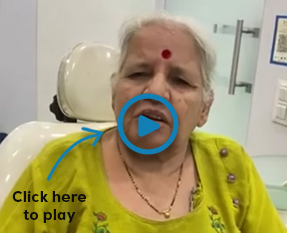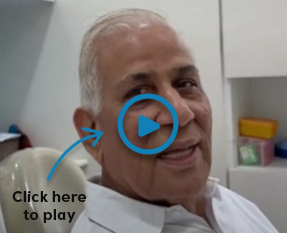Get To Know More About Root Canal
The soft inner part of the teeth, known as the pulp, may require a root canal procedure when it becomes injured or infected.
If left untreated for an extended period, the infection can rapidly spread to adjacent areas.
Typically performed under anesthesia, a root canal involves thorough cleaning of the interior to prevent further penetration of new infections.
Following this, medication is applied and the tooth is sealed. As a root canal procedure weakens the tooth, it is essential to have a crown fixed as part of the post-treatment process.
Root Canal Treatment Procedure Steps

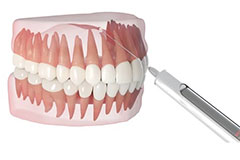
Anaesthesia
This is the first and foremost step of the root canal. A root canal is a very painful experience, thus to ease the pain, anaesthesia is always preferred.
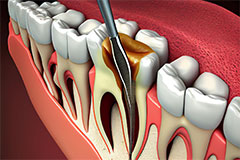
Infected Pulp is removed
When under anaesthesia, the most painful part takes place, that is removing the infected pulp. The pulp is removed by making a small opening on top of the tooth.
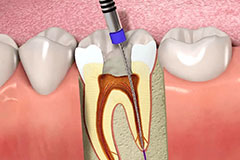
Coating with antibiotics
After the infected pulp is removed, the area will be coated with antibiotics to confirm prevention of further infection. Antibiotics will also be prescribed for better healing.
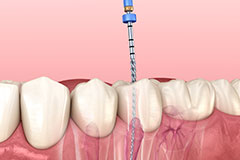
Filling
The procedure will end by filling the small opening created during the process. This temporary filling prevents saliva from damaging the canal.
Book Your Pain-Free Root Canal Treatment Now
Advantages of Root Canal

Say goodbye to Pain
When any of your teeth are getting close to a root canal, it means that you’re already experiencing immense pain. Root canal is a saviour for this unbearing pain and it’s necessary you get the help at the earliest.

Natural tooth for the win
The ultimate goal of root canal is to preserve your natural teeth. When the pulp below your teeth is infected, overtime the tooth can start getting affected too. Thus, to save your teeth, root canal comes to the rescue!

Suitable for the long run
Root canal prevents further complications and treatments. If the treatment is not performed in time, it can be manifested into a bigger problem with a more expensive treatment such as tooth extraction.
Before & After Gallery
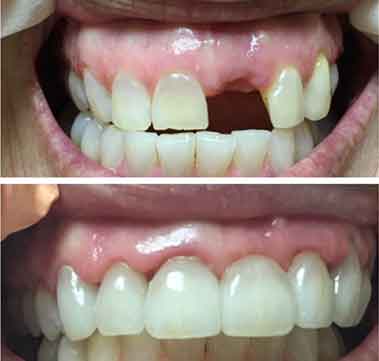

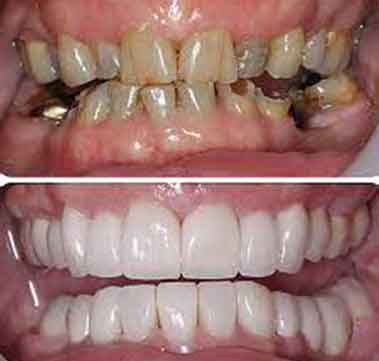
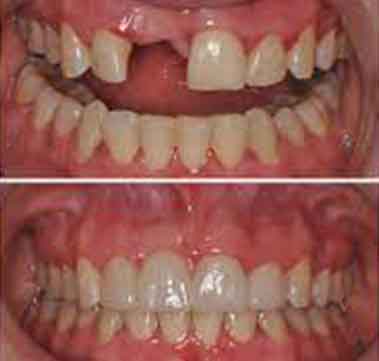
Get a Free Quote for Painless Root Canal Treatment
Our patient's Experiences
Frequently Ask Questions
A root canal is a dental procedure designed to address issues within the pulp chamber of a tooth, which contains the nerves and blood vessels. When the pulp becomes infected or inflamed due to deep decay, a crack, or trauma, a root canal is performed to remove the damaged or infected pulp, clean the root canals, and seal them to prevent further infection. The procedure involves accessing the pulp chamber through the crown of the tooth, removing the affected tissue, and thoroughly cleaning and disinfecting the root canals. After cleaning, the canals are filled with a biocompatible material, and the tooth is typically restored with a crown to provide strength and protect it from further damage. Root canals are essential in preserving a tooth that would otherwise need extraction, allowing patients to maintain natural dentition and function. Root canal therapy is often recommended when there is severe tooth pain, sensitivity to hot or cold, swelling, or an abscess, indicating infection or inflammation within the pulp. While the term "root canal" may evoke concerns, advances in dental techniques and technology have made the procedure relatively straightforward and comfortable for patients. Dental professionals at reputable clinics may recommend root canal therapy as part of a comprehensive treatment plan, which may include other procedures like teeth whitening, dental bonding, or the placement of crowns and bridges, ensuring optimal oral health and a harmonious smile. Regular dental check-ups are crucial for detecting issues early and determining the most appropriate interventions to preserve natural teeth and maintain overall dental well-being.
The need for a root canal is often indicated by specific symptoms and dental conditions. Severe tooth pain, especially when chewing or applying pressure, can be a sign that the pulp chamber of the tooth is compromised. Additionally, heightened sensitivity to hot or cold temperatures that lingers after the stimuli are removed may indicate inflammation or infection in the pulp. Swelling, tenderness, or the presence of an abscess around the affected tooth are further indications that the pulp may be damaged or infected, warranting the need for a root canal. Dentists will conduct a thorough examination, potentially utilising X-rays, to assess the extent of the issue and determine if a root canal is necessary to address the underlying problem and alleviate the associated symptoms. Other instances that may necessitate a root canal include trauma to the tooth, deep decay that reaches the pulp, or cracks in the tooth structure. If left untreated, these conditions can lead to more severe complications and potentially result in the loss of the affected tooth. Dental professionals at reputable clinics will carefully evaluate each patient's case, considering the symptoms, diagnostic imaging, and overall oral health, to determine the appropriate course of action. Root canal therapy may be part of a comprehensive treatment plan that addresses various dental concerns, such as braces for misalignment, teeth whitening for cosmetic enhancement, or the placement of crowns and bridges to restore both function and aesthetics. Regular dental check-ups are essential for early detection and intervention, helping to preserve natural teeth and maintain optimal oral health.
While the reputation of root canal procedures might evoke fear or anxiety, advancements in dental techniques and anaesthesia have significantly minimised discomfort during the procedure. Dentists typically administer local anaesthetic to numb the affected tooth and surrounding tissues, ensuring that patients do not feel pain during the root canal. The use of modern anaesthetics and techniques helps create a comfortable and virtually pain-free experience for individuals undergoing this dental treatment. Dentists prioritise patient comfort and can discuss any concerns or anxieties before the procedure, offering additional sedation options if necessary. It's important to note that any discomfort or pain experienced during a root canal is often associated with the symptoms leading to the procedure rather than the root canal itself. The objective of the root canal is to relieve pain and address the underlying issue causing the discomfort. After the procedure, patients may experience some mild soreness or discomfort, which can typically be managed with over-the-counter pain medications. Dental professionals at reputable clinics prioritise patient well-being, providing clear communication about the procedure, managing pain during the root canal, and offering guidance on post-procedure care. Integrating root canal therapy with other dental treatments, such as braces, teeth whitening, or the placement of crowns and bridges, allows for a comprehensive approach to address various dental concerns and achieve optimal oral health and aesthetics.
After completing the root canal procedure, it is common to experience some mild discomfort or soreness for a few days. This discomfort is usually manageable with over-the-counter pain medications and should gradually subside as the healing process progresses. The pain experienced after a root canal is often associated with the inflammation of the surrounding tissues during the procedure and the natural response of the body to the treatment. Dental professionals may provide specific post-procedure care instructions to help alleviate any discomfort and promote a smooth recovery. It's important to note that the intense pain or sensitivity that led to the need for a root canal is expected to diminish after the procedure. The root canal aims to eliminate the source of infection or inflammation within the tooth, providing relief from the initial symptoms. Patients are advised to follow any post-operative instructions provided by their dentist, such as avoiding certain foods or activities, to support the healing process. Integrating root canal therapy with other dental treatments, such as braces, teeth whitening, or the placement of crowns and bridges, allows for a comprehensive approach to address various dental concerns and enhance both oral health and aesthetics. Regular follow-up appointments with dental professionals at reputable clinics are essential to monitor the healing progress and ensure the overall success of the root canal treatment.
After a root canal, the tooth typically requires additional treatment to ensure its long-term stability and function. The most common post-root canal procedure is the placement of a dental crown. A crown is a protective cap that is placed over the treated tooth to provide strength, support, and protection. It helps prevent the tooth from further damage, such as fractures, and restores its natural appearance. The crown is custom-made to match the shape and color of the patient's natural teeth, ensuring a seamless integration into the smile. In some cases, additional treatments may be necessary, depending on the specific condition of the tooth and the extent of prior damage. Dental professionals at reputable clinics may recommend further interventions, such as dental bonding for cosmetic enhancements, teeth whitening for a brighter smile, or other restorative procedures like bridges to address missing teeth. Integrating these additional treatments allows for a comprehensive approach to dental care, addressing various concerns and enhancing both oral health and aesthetics. Regular follow-up appointments with dental professionals are crucial to monitor the condition of the treated tooth and address any emerging issues promptly, ensuring the long-term success of the root canal procedure and the overall well-being of the patient's oral health.
The longevity of a root canal depends on various factors, including the overall oral health of the patient and how well they adhere to post-treatment care. When performed by a skilled dental professional and combined with appropriate follow-up care, a root canal is designed to be a long-lasting solution. The success of the root canal procedure is contingent on eliminating the infection or inflammation within the tooth and sealing the root canals effectively. The placement of a dental crown after the root canal further enhances the tooth's strength and resilience, preventing fractures and ensuring its functionality for an extended period. Regular dental check-ups are crucial for monitoring the treated tooth and identifying any potential issues early on. Additionally, maintaining good oral hygiene practices, such as regular brushing, flossing, and routine dental cleanings, can contribute to the long-term success of the root canal. Dental professionals at reputable clinics may also recommend integrating other treatments, such as braces, teeth whitening, or the placement of crowns and bridges, to address any additional dental concerns and enhance both oral health and aesthetics. Adhering to the recommended post-treatment and ongoing care guidelines will significantly impact the durability of the root canal and contribute to the overall well-being of the patient's oral health.
Directors & Cluster heads
Our administration and support staff all have exceptional people skills and Trained to assist you with all medical enquiries.

Dr. Kunal Shet
BDS, MDS, Orthodontics & Dentofacial Orthopedics, Implantologist (Masters in Cortical Implantology)
Dr. Kunal Shet is a distinguished dentist with an impressive academic background, including a postgraduate degree in Orthodontics and Dentofacial Orthopedics.

Dr. Riddhi Rathi Shet
BDS, MDS in Orthodontics & Dentofacial Orthopedics, Masters in Cortical and Immediate loading Implantologist (Italy), Masters in Advance Implantology (Smile USA)
Dr. Riddhi Rathi Shet is a highly qualified dental professional with an impressive academic background, including BDS and MDS degrees.

Dr. Sayali Jadhav
BDS, Fellowship in esthetic dentistry and Occlusion Certified Implantologist
Dr. Sayali Jadhav is a highly regarded Certified Implantologist and Esthetic Dentist. Her dental journey commenced in 2014 when she completed her BDS from Dr. DY Patil University.

Dr. Isha Jain
BDS
Dr. Isha Jain, a highly distinguished dentist who proudly graduated from Dr. D. Y. Patil Vidyapeeth, Pune in 2017.
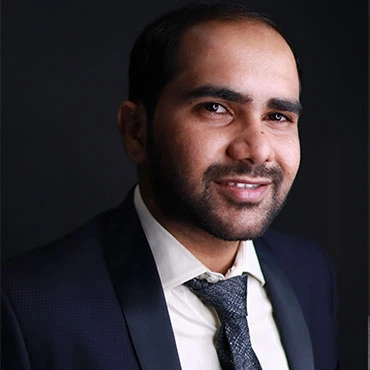
Dr.Akhil Nair
BDS Implantologist
Dr. Akhil Nair is a highly accomplished Certified Implantologist, known for his remarkable contributions to the field of dentistry.

Dr. Akash Balaji Iyer
BDS, MDS Periodontology and Oral Implantology
Dr. Akash Balaji Iyer, an accomplished dentist specializing in Periodontics & Oral Implantology, is a vital part of Orthosquare's expert team.

Dr. Apurva Vaidya
BDS, MDS (Oral and maxillofacial surgery) Implantologist
Dr. Apurva Vivek Vaidya, BDS, MDS in Oral and Maxillofacial Surgery, stands as a distinguished dental professional with specialized expertise in oral and maxillofacial surgery.

Dr. Ruchi Bhansali
Dr. Ruchi Bhansali is a Dentist, Aesthetic smile design, Implantologist, and Periodontology.
Dr. Ruchi Bhansali is a highly qualified and compassionate dentist dedicated to delivering personalized dental care.

Dr. Divya Navsariwala Iyer
BDS. Specialist in Cosmetic Dentistry & Smile Designing.
Dr. Divya Navsariwala Iyer, a distinguished dentist and Smile Designing Specialist, holds the position of Regional Head for Pune at Orthosquare. With a BDS degree from Pravara Institute of Medical Sciences and a remarkable decade of clinical experience, she is recognized for her expertise in smile designing, aesthetics, and dental veneers.

Dr. Dhwani Doshi
BDS
Dr. Dhwani Doshi, BDS, is a distinguished dentist with a specialization in cosmetic dentistry, smile designing, and root canals, holding a certification as an FMR specialist. Graduating from MGM Dental College, Navi Mumbai, in 2013-17, she brings a strong academic foundation to her practice.

Dr. Nehal Gandhi
BDS
Dr. Nehal Gandhi, a distinguished Dental surgeon and Director at Orthosquare Multi-speciality Dental Clinic, stands as a prominent figure in the field of dentistry.

Dr. Shraddha Kambale
BDS
Dr. Shraddha Kambale holds the esteemed position of Regional Dental Director and is a highly proficient general dentist with over 16 years of practice.

Nilay Vakharia
BDS, MDS (Oral & Maxillofacial Surgery)Implantologist.
Dr. Nilay Vakharia, an OMFS (Oral & Maxillofacial Surgery) specialist, completed his post-graduation in OMFS from Pacific Dental College in 2017.
.webp)
Dr. Shail Kothari
BDS, Specializing in Implantology.
Dr. Shail Kothari is a highly skilled dental professional, specializing in Implantology and Endodontics. He completed his graduation from Dr. D. Y. Patil University in Mumbai and pursued his master's degree in Dentistry from esteemed institutions in Bangalore and the USA.


